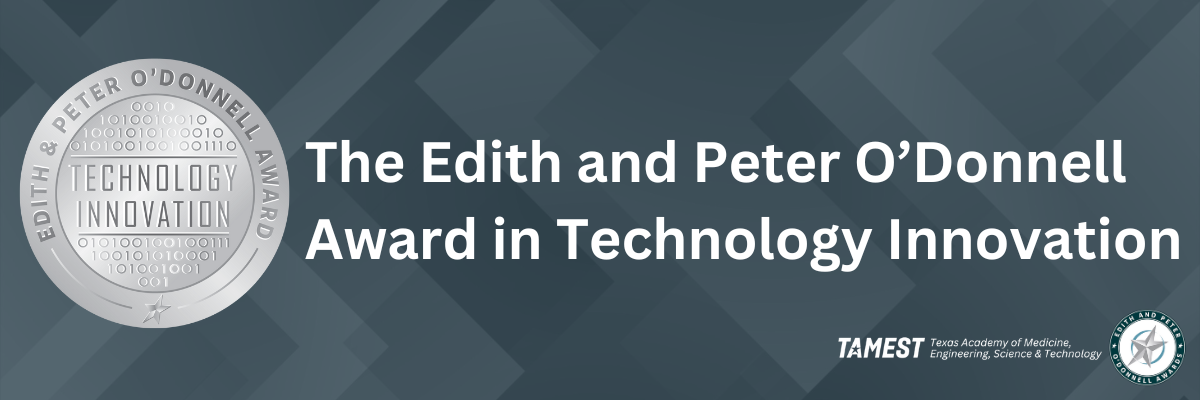
About the Edith and Peter O’Donnell Award in Technology Innovation
The Edith and Peter O’Donnell Awards were established in 2006. They are named in honor of Edith and Peter O’Donnell, who were among Texas’ most devoted advocates for excellence in scientific advancement and STEM education. The awards recognize rising star Texas researchers who are addressing the essential role that science and technology play in society and whose work meets the highest standards of exemplary professional performance, creativity and resourcefulness.
The Edith and Peter O’Donnell Award in Technology Innovation was established in 2008 and is specifically designed to recognize individuals in applied sciences and engineering from the private sector or government who have either made a major innovative technological discovery or whose career achievements have resulted in major discoveries that have the potential for making a significant impact on society. Recipients of this award have made an extraordinary degree of advancement in the concept, design, fabrication, manufacturability, acceptability, usefulness and/or availability of such products, methodologies or services.
The Edith and Peter O’Donnell Award in Technology Innovation honors Texas innovators with a $25,000 honorarium, profile video and an invitation to present their research at the TAMEST Annual Conference.
Most Recent Technology Innovation Recipient

Dr. Hu specializes in reinforcement learning (RL), an AI approach that learns by trial and error. While RL has proven powerful in fields like robotics and gaming, it had rarely been applied successfully to high-stakes oilfield operations. By combining AI with bp’s powerful computing systems, Dr. Hu has successfully applied RL tools to complex processes like hydraulic fracturing to help make smarter, safer and more efficient decisions in real time.
Her system has been used in over 40 field operations and is estimated to deliver more than $20 million in annual savings for bp by providing real-time predictions, supporting timely decisions and reducing costly delays. Her work also serves as a powerful training tool, helping transfer expert knowledge to younger engineers through re-playable simulations of real-world scenarios.
In addition to her work in oil and gas, Dr. Hu is applying RL to renewable energy challenges, such as optimizing wind turbine performance. She is also developing scalable AI architectures that integrate with physics-based models to enhance fuel production and environmental results. These efforts contribute to advancements in intelligent, resilient and sustainable practices within the energy sector.
Past Technology Innovation Recipients
Faye Liu, Ph.D., RevoChem LLC | 2025
For pioneering geochemical fingerprinting technology to optimize energy production processes thousands of feet below the Earth’s surface.
Learn More >
Watch Dr. Liu’s Award Acceptance >
Kimberly A. Hambuchen, Ph.D., NASA Johnson Space Center | 2024
For her seminal research in developing new methods for making robots more autonomous and usable by humans across a time delay.
Learn More >
Chengbo Li, ConocoPhillips | 2023
For his innovations in industry-leading Compressive Seismic Imaging (CSI) technology and the development of core algorithms and software infrastructure.
Learn More >
Ashers Partouche, Schlumberger | 2022
For the wellbore formation testing technology platform he helped develop, Ora, which is in use globally in the energy industry.
Learn More >
Watch Dr. Partouche’s Award Acceptance >
Christian A. Davies, Ph.D., Shell | 2021
For his development of a broad suite of alternative carbon management technologies to reduce emissions for a lower carbon future.
Learn More >
Kristine Kieswetter, Ph.D. & Deepak Kilpadi, Ph.D., KCI | 2020
For their contributions to better wound therapy. Drs. Kieswetter and Kilpadi have both been the driving force behind the evolution of the use of negative pressure wound therapy (NPWT), which has set the standard for advanced wound care.
Learn More >
Watch Dr. Kieswetter and Dr. Kilpadi’s Award Acceptance >
Terrence F. Alger II, Ph.D., Southwest Research Institute | 2019
For his work on vehicle engines is already resulting in lower levels of pollution and better fuel economy. He developed a technology known as Dedicated Exhaust Gas Recirculation, or D-EGR®, where exhaust gas from the engine is given back to the fresh air being drawn into the engine, cooling the air.
Learn More >
Watch Dr. Alger’s Award Acceptance >
Van N. Truskett, Ph.D., Canon Nanotechnologies, Inc. | 2016
For her impactful body of work in science, inventorship and engineering on some of the most fundamental and important problems for enabling nanoscale manufacturing in semiconductors, hard disk drives and flexible films for display applications.
Learn More >
Watch Dr. Truskett’s Award Acceptance >
Charles J. Collins, Ph.D., Luminex Corporation | 2015
For his contributions to advance clinical diagnostics, healthcare and scientific research across the globe.
Learn More >
Watch Dr. Collin’s Award Acceptance >
James Walker, Ph.D., Southwest Research Institute | 2014
For his pioneering work, development and modeling in impact theory, penetration mechanics, material characterization and response under dynamic loading.
Learn More >
Watch Dr. Walker’s Award Acceptance >
Timothy J. Nedwed, Ph.D., ExxonMobil Upstream Research Company | 2013
For his innovative approaches in furthering the industry’s capabilities for responding to offshore oil spills.
Learn More >
Watch Dr. Nedwed’s Award Acceptance >
Ted S. Moise, Ph.D., Texas Instruments | 2012
For the research, development and production of ferroelectric random-access memory (FRAM) embedded with advanced silicon integrated circuits.
Learn More >
David Fuller III & Duncan Hudson III, National Instruments | 2011
For technology innovation in graphical programming and rapid application development for scientific and engineering applications in test, measurement, control and embedded system design.
Learn More >
S.V. Sreenivasan, Ph.D. (NAE), Molecular Imprints, Inc. | 2010
For his scientific and engineering contributions to the development of Step and Flash Imprint Lithography and the products of Molecular Imprints, Inc.
National Academy of Engineering: 2021
Learn More >
Sameer P. Pendharkar, Texas Instruments | 2008
For research related to designing highly efficient and cost-efficient semiconductor devices and high voltage technology for next generation analog and high power systems.
Learn More >

